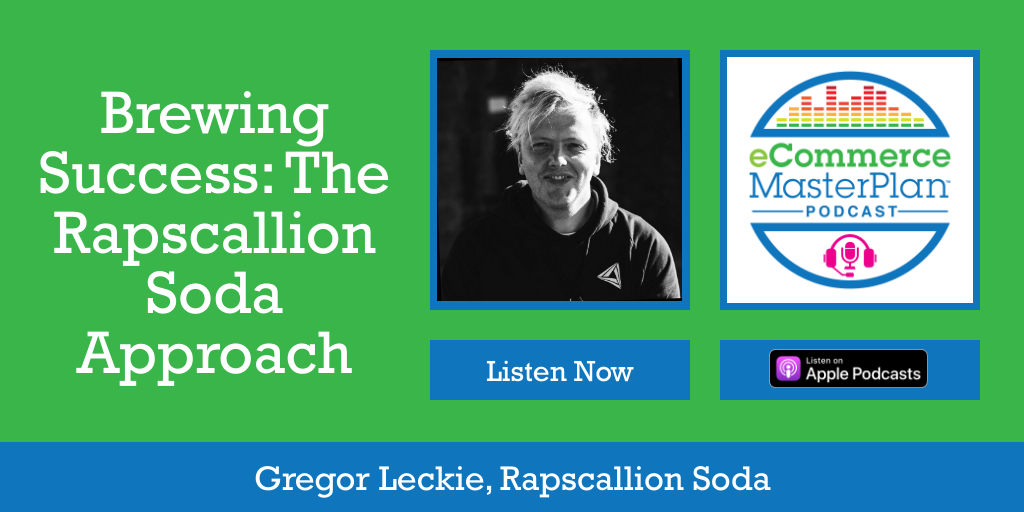Growth Lessons in the Beverage Industry with Rapscallion Soda’s Gregor Leckie (episode 497)
Gregor Leckie is the founder and managing director of Rapscallion Soda. Founded in 2018, they’ve shipped over three quarters of a million cans! Selling via their DTC Shopify store and B2B Shopify trade site, they’re now doing over 1,000 orders a month.

Listen now for free:
Subscribe on your Favourite Podcast App
Dive in:
[03:32] Transitioned from wholesale to digital, achieved growth.
[08:06] Passionate about nose-to-tail, from fruit.
[11:59] Efficient facility for long-term, sustainable operations.
[13:39] Improving soft drink production for environment.
[17:31] Business prioritizes transparency, seeks customer understanding.
[21:24] Scotland’s diverse producers, plans for Scottish citrus.
[22:52] Listen to Gregor’s Top Tips!
Adaptability in Business Strategy
Businesses must be flexible and ready to adapt their strategies in response to changing market conditions. This agility can turn potential setbacks into opportunities for growth and expansion. Gregor’s decision to shift Rapscallion Soda from a predominantly wholesale model to a DTC eCommerce model during the pandemic showcases the importance of being able to adapt. When the pandemic hit and wholesale clients disappeared overnight, Gregor shifted his business online, which led to significant growth.
Sustainability as a Core Business Principle
Integrating sustainability into the core of your business operations can lead to long-term benefits, including cost savings, brand differentiation, and customer loyalty. It’s about making smart, efficient choices that are good for the business and the environment. But Gregor says sustainability is not just a marketing tool. It’s an integral part of Rapscallion Soda’s business model. The company’s commitment to using fresh, local ingredients, minimizing waste, and investing in renewable energy and innovative processes highlights how sustainability can drive efficiency and economic sense.
Direct Relationships with Suppliers and Customers
Developing direct and transparent relationships with suppliers and customers can enhance product quality and build strong brand loyalty. This approach ensures that the business supports its local community and creates products that resonate deeply with consumers. Rapscallion Soda’s strategy involves building direct relationships with farmers and customers. This transparency and authenticity create a strong brand identity and trust among consumers. The company’s seasonal and single-origin products reflect its commitment to quality and its close ties with local growers.
Innovation in Production Processes
Investing in innovative production processes can lead to unique product offerings and operational efficiencies. This differentiation can help a business stand out in a crowded market and meet its sustainability objectives. The development of their own production facility and innovative techniques are key aspects of Rapscallion Soda’s operations. This innovation not only supports their sustainability goals but also sets them apart in the market.
Effective Use of Limited Edition and Seasonal Products
Limited edition and seasonal products can be powerful marketing tools that create excitement and demand. By aligning product offerings with seasonal availability, brands can enhance their appeal and encourage repeat purchases. Rapscallion Soda’s strategy of offering seasonal and limited-edition products helps create buzz and urgency among customers. This approach leverages the natural cycle of fruit availability and adds an element of exclusivity to their offerings, driving customer interest and sales.
eCommerce Book Top Tip
- DotCom Secrets: The Underground Playbook for Growing Your Company Online by Russell Brunson
- The Hard Thing About Hard Things: Building a Business When There Are No Easy Answers by Ben Horowitz
eCommerce Traffic Top Tip
- Instagram Reels
Tool Top Tip
- Google Workspace and Spaces for collaboration
Carbon Top Tip
- For Gregor, it’s having control over their facility to reduce their carbon footprint. He adds focusing on waste reduction, renewable energy, and sustainable packaging. He also mentions the use of aluminum cans and scrutinizing fulfillment partners for their eco-credentials. It’s all about achieving efficiency and making environmentally conscious choices throughout the supply chain.
Interview links
- Check out Rapscallion Soda
- Enter the code “masterplan5” for £5 off an order
- Gregor on LinkedIn
*Thank you to Adam Bastock from Small99 for the guest introduction!
Related Episodes
- Discover the perfect DTC Playbook with DTC veteran Mike Stevens (episode 390)
- Why Customer Research and a Slow Startup works for Gusto Snacks with Giuseppe Baidoo (episode 409)
- How Priory Direct is Changing B2B eCommerce with Sustainable Packaging (episode 482)
Without the sponsors the podcast wouldn’t be possible – please do check them out:

Shopify recently turned the tables on me, and took me from interviewer to interviewee.
Knowing, as they do, that the most successful retailers today are those that bridge the gap between online and offline and make it a seamless experience, Shopify wanted my thoughts on how to achieve truly connected commerce, particularly in the key areas of local selling, omnichannel selling and cross border selling.
You can read my thoughts, along with other commerce experts from Germany, France, Spain and Italy by downloading the report.
Full transcript to read & download:
Like to be a guest? Apply Here‘



